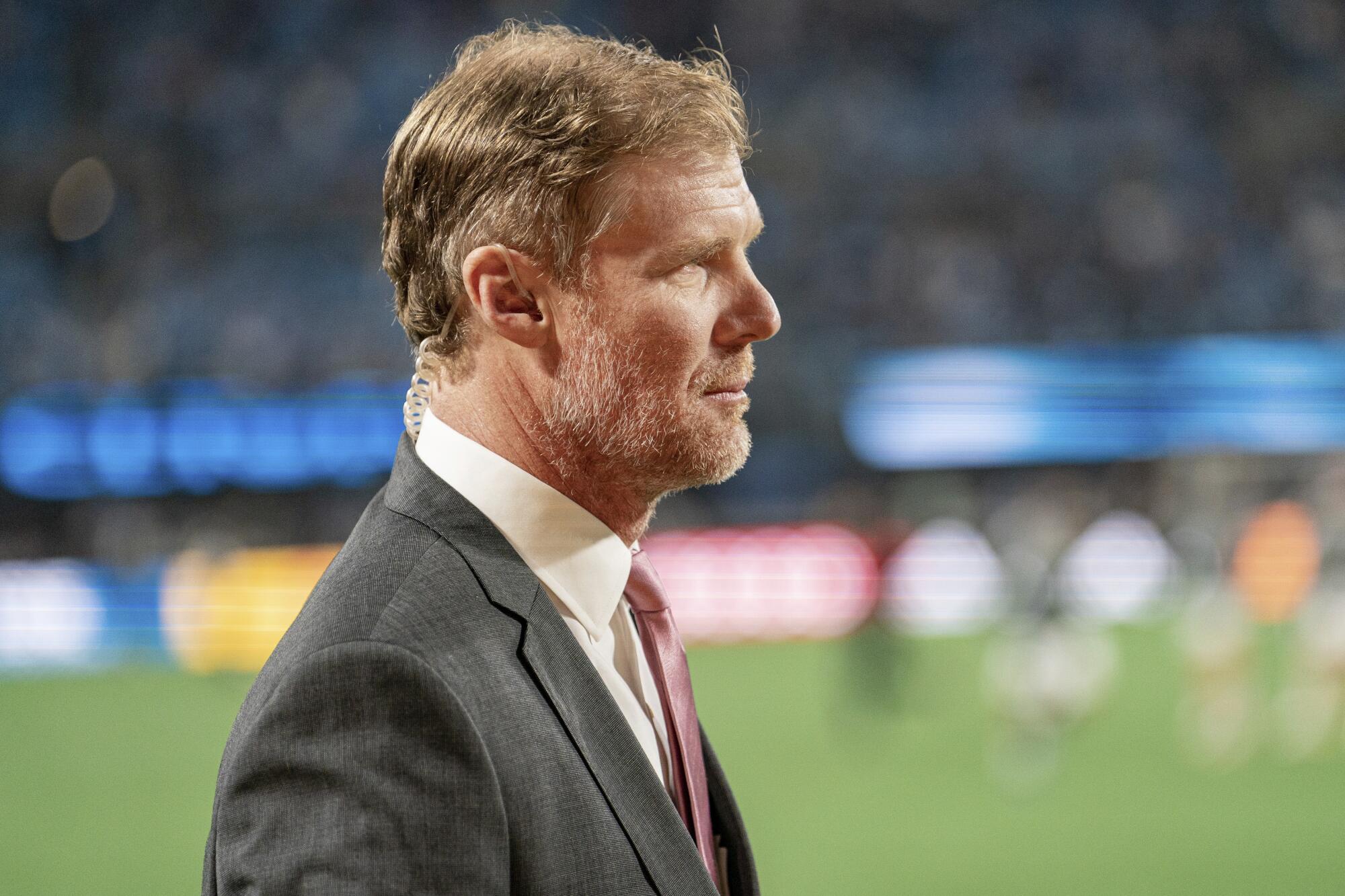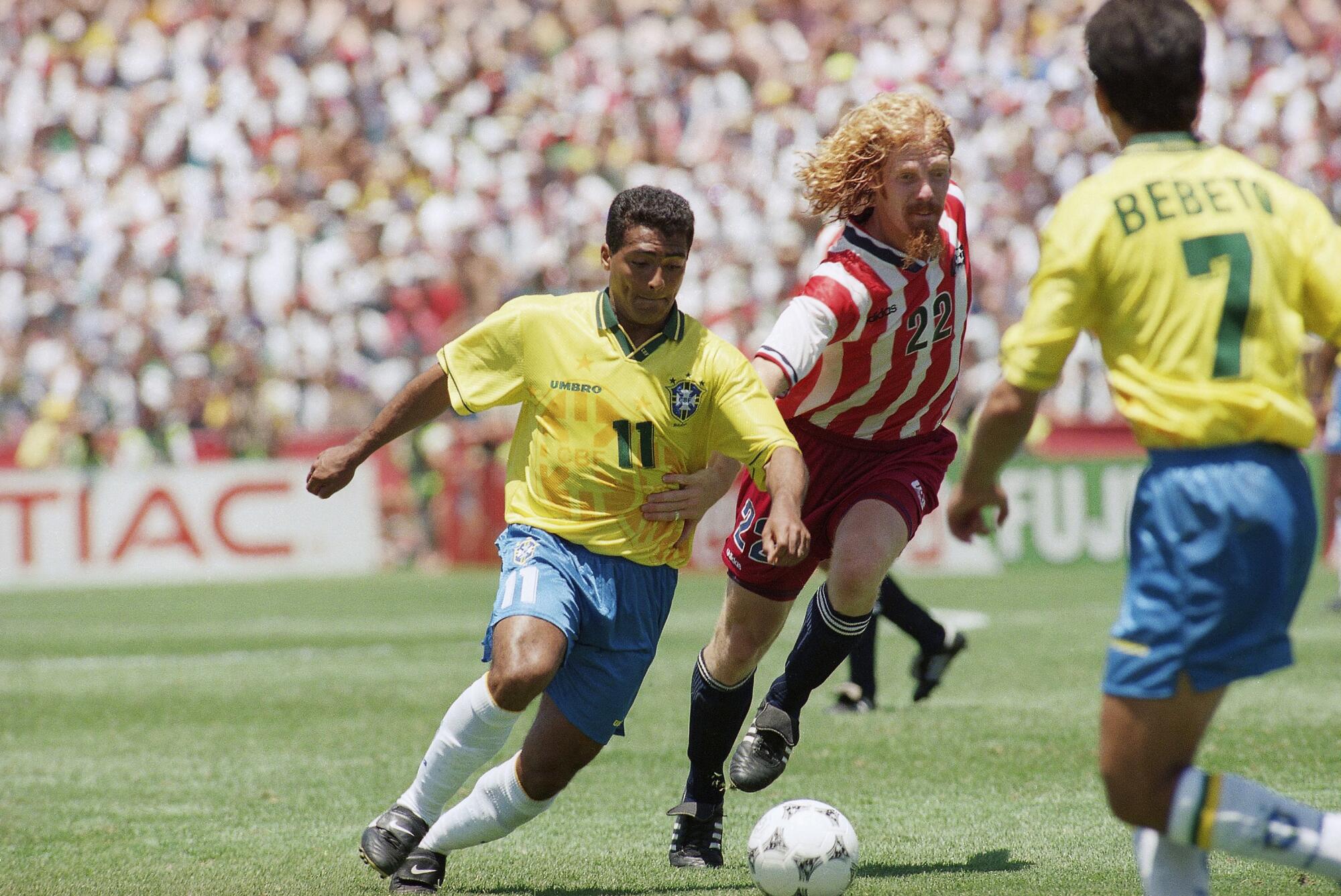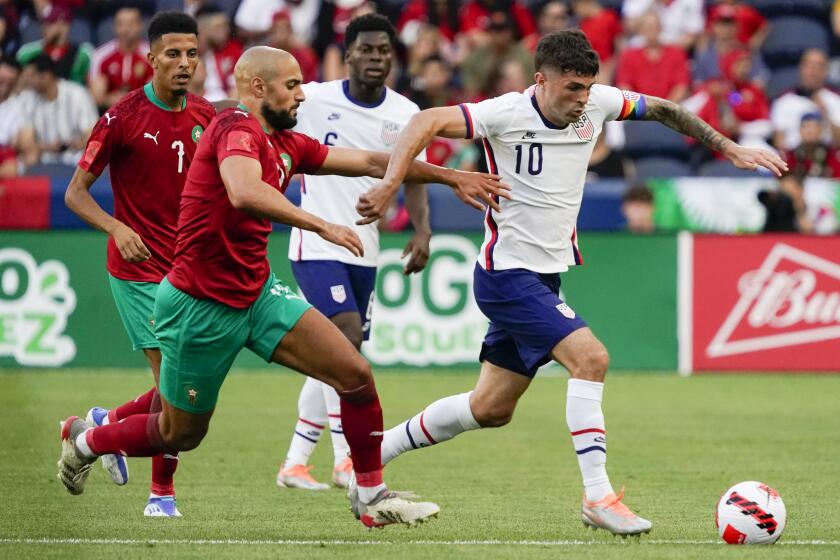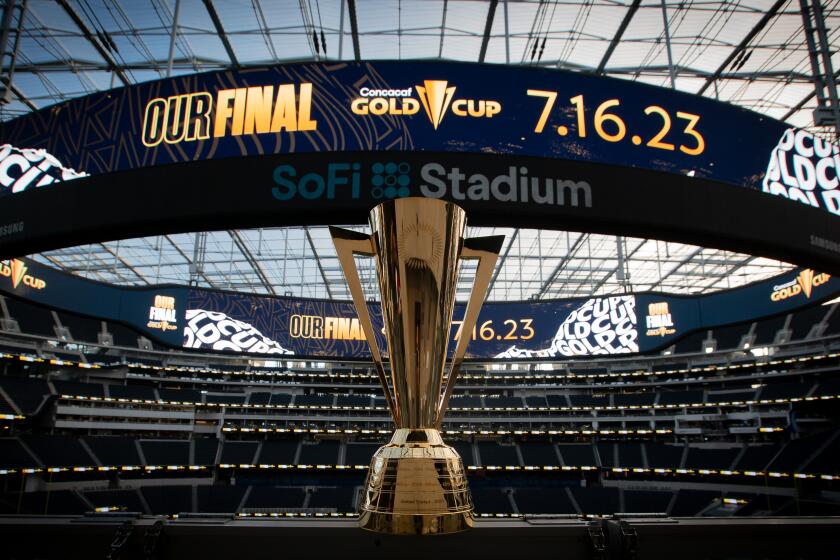
- Share via
As someone who has played in a World Cup and broadcast one, Alexi Lalas says the biggest difference between the two is what you wear to the game. Everything else is pretty much the same.
“There are obvious similarities in terms of preparation, both mental and physical,” said Lalas, who now wears a suit and tie instead of shorts and a shirt with a number on it. “There is a recognition of opportunity, there is a recognition of scrutiny, there is an understanding of responsibility and the potential for success, failure, praise, criticism, all those different things.”
Even the anxiety is the same, said Stu Holden, who, like Lalas, has experienced a World Cup game on the field and behind a microphone.
“Standing there moments before the World Cup final in 2018 was probably the closest I’ve come to the rush of being a professional athlete,” Holden said. “When I knew that red light was coming on, I had those butterflies, that good nervous energy of, ‘Man, this is a big deal.’ ”
Lalas, who made two U.S. World Cup rosters, and Holden, who was chosen for one, never played with each other, but this month they will be working their second World Cup together as broadcasters for Fox Sports in Qatar, part of a 25-person team that includes 11 former players who took part in 24 World Cups combined.
The U.S. men’s national team will play matches at Banc of California Stadium and Dignity Health Sports Park after the World Cup in Qatar.
The tournament, which kicks off its 28-day run Nov. 20, will be broadcast in Spanish on Telemundo.
“Former players channel viewpoints other announcers can’t,” said David Neal, vice president of production for Fox Sports and executive producer of the network’s World Cup coverage, who has added Landon Donovan and Clint Dempsey, the leading scorers in U.S. men’s history, and Carli Lloyd, a two-time world player of the year, to his team.
“They stood shoulder to shoulder with their teammates as national anthems blared and stadiums roared. The good ones channel those incredible emotions and recall those World Cup experiences. The great ones engage the audience with fantastic storytelling.”
But all of them fall back on the things they learned as players to make it through the monthlong tournament.
“This is a marathon and not a sprint,” said Lalas, who will be working his fifth World Cup as a studio analyst. “Pacing yourself, taking care of yourself, routine is your friend. Getting sleep, working out, making sure that you are continually digesting all of the news and the narratives, all that stuff is important.”

So is preparation.
“One of the things I learned in the last World Cup was that you do this mammoth amount of prep work ahead of the tournament, and then you get into the tournament and all of that really does help your base,” Holden said. “But after maybe the first couple of games it’s all about what’s happening now and what was the last game like and not what the team did three, four months ago.
“Once that game is going, it’s like a player. It’s reactive. It’s instinct. It’s having a feel for the game and the moments and seeing if you can be as good as the moments warrant.”
The CONCACAF Gold Cup soccer tournament will conclude on July 16 at SoFi Stadium, giving the venue a chance to audition for the 2026 World Cup final.
Managing fatigue and relying on teammates are also important. Four years ago in Russia, Holden and play-by-play partner John Strong spent the long, sleepless nights between games flying to distant cities. At one point, Strong complained of being tired and Holden shot back with a cliché he had learned as a player.
“I said: ‘Tired is just a mental state. You are not tired, and we are going to get through this,’ “Holden told Strong supportively. “The team aspect is a really underrated element of broadcasting.”
Lalas agreed. Just as there is only one ball on a soccer field, there is generally only one person at a time talking during a soccer broadcast, and it can be difficult to know when to speak up and when to pass the mic to a teammate.

“In professional sports, athletes, like people in media and certainly broadcasters, we’re a bunch of egotistical maniacs,” Lalas said. “Accepting that you are part of the team and doing things that are going to help the team, that’s the essence of a team, whether it’s a team in sports or a team broadcasting a World Cup.
“This is, for many that are going to play in a World Cup, the realization of a dream. From a broadcast perspective, and certainly from my perspective, this is our World Cup too.”
“This is, for many that are going to play in a World Cup, the realization of a dream. From a broadcast perspective, and certainly from my perspective, this is our World Cup too.”
— Alexi Lalas, who will be working his fifth World Cup as a studio analyst
And it will take a team to get through it. Fox Sports will produce 128 hours of linear programming from all 64 matches — 34 on Fox and 30 on cable outlet Fox Sports 1 — and nearly 100 hours of studio programming. Additionally, every match will stream live on the Fox Sports App and be available for free on-demand replays on Tubi.
What won’t be covered, Neal said, are things happening outside the stadium, such as Qatar’s controversial treatment of migrant workers, which many human-rights groups say borders on slavery.
“If it affects what happens on the field of play, we will cover it and cover it fully,” Neal said at a news conference last month. “But if it does not, if it is ancillary to the story of the tournament, there are plenty of other entities and outlets out there that are going to cover that. We firmly believe the viewers come to us to see what happens on the field.”
Fox followed the same playbook four years ago when it declined to criticize its World Cup hosts on issues of racism and sexism. But what really hurt the network’s ratings from Russia was the time difference, with games kicking off in the morning in the Pacific time zone, and the failure of the United States to qualify for the tournament. As a result, Fox and Telemundo averaged just 4.6 million viewers per game, a decline of more than 43% from the audience ESPN and Univision drew in 2014.
The U.S. team is back this year but so are the morning kickoffs, and the impact that will have on Fox’s audience remains to be seen. There are no scoreboards for broadcasts, after all, so when the games are over, victory or defeat is decided by the viewers, which is another thing to which the former players have had to adjust.
“And we don’t get any trophy at the end,” Holden said.









